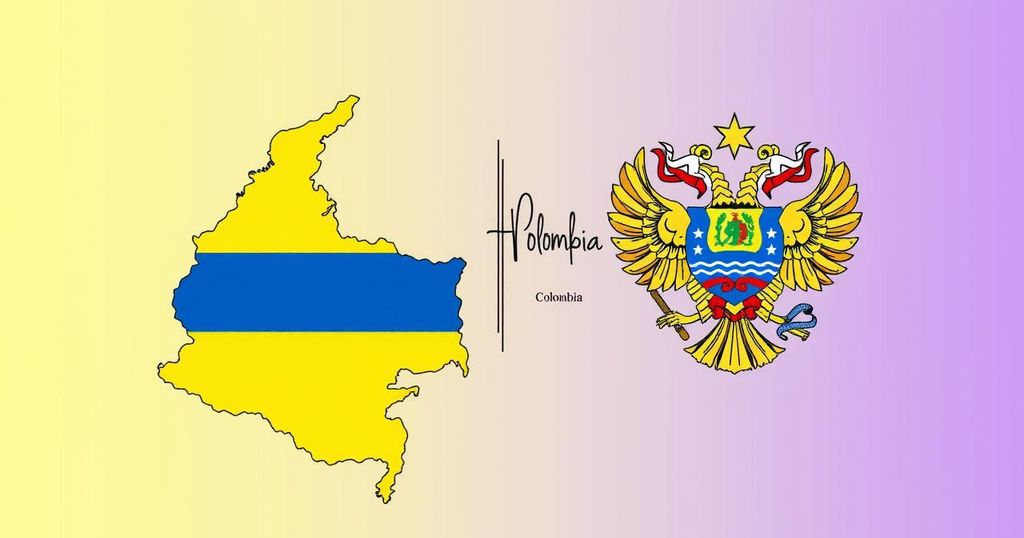Global news
BILATERAL RELATIONS, BILATERAL TALKS, BOGOTA, BR, BRICS, BRICS NEW DEVELOPMENT BANK, COLOMBIA, COOPERATION, DILMA ROUSSEFF, DIPLOMACY, EUROPE, KREMLIN, LUIS GILBERTO MURILLO, MIDDLE EAST, MU, MURILLO, RUSSIA-UKRAINE WAR, SERGEY LAVROV, SOUTH AMERICA, SWITZERLAND, UKRAINE, UNITED NATIONS, UNIVERSITY OF, UNIVERSITY OF LA SABANA, VOL, VOLODYMYR ZELENSKIY, ZELENSKIY
Jamal Walker
0 Comments
Colombia Pursues BRICS Membership and Strengthens Ties with Russia
Colombia is pursuing BRICS membership to enhance international partnerships and secure funding. Foreign Minister Luis Gilberto Murillo’s recent talks in Moscow focused on strengthening bilateral relations with Russia and discussing cooperation across trade, science, and environmental issues. Colombia expresses readiness to mediate in the Russia-Ukraine conflict, while also addressing global climate concerns, marking a proactive diplomatic strategy.
Colombia has shown a strong inclination toward joining the BRICS group as it seeks to broaden its international partnerships and tap into new financing opportunities. This was articulated by Foreign Minister Luis Gilberto Murillo during his recent diplomatic visit to Moscow. Murillo underlined the ongoing dialogues with the BRICS New Development Bank, which is currently spearheaded by Dilma Rousseff. The primary objective of Murillo’s visit was to fortify Colombia’s bilateral relations with Russia, paving the way for renewed diplomatic engagement as the two nations approach the milestone of their 90th anniversary of formal relations in 2025. Russian Foreign Minister Sergey Lavrov affirmed that both countries intend to reactivate a bilateral commission focused on enhancing cooperation across several domains including trade, science, and economics. The discussions also encompassed cultural and academic collaborations, marked notably by Murillo being honored with the title of Emeritus Professor by a Russian academic institution. In remarks made by the Kremlin, it was emphasized that “Colombia is a promising partner for Russia in Latin America. The two countries’ relations are based on traditional friendship and cooperation, mutual trust and respect.” The conversations further explored pressing global issues such as the ongoing conflicts in Ukraine and the Middle East. Murillo reiterated Colombia’s readiness to facilitate mediation efforts in the Russia-Ukraine conflict, promoting a diplomatic dialog. “We invite [Russia and Ukraine] to resolve this in political and diplomatic dialogues, to talk about peace. […] Bogotà is ready to contribute insofar as they request it,” stated Murillo, outlining Colombia’s willingness to play a constructive role in the resolution of this crisis. In an emerging political climate, Ukrainian President Volodymyr Zelenskiy expressed disappointment over Colombia’s absence from a recent peace summit in Switzerland, urging the Colombian leadership to contribute to efforts in restoring justice in Ukraine. On the issue of environmental sustainability, Colombia raised its concerns regarding the global climate crisis and sought Russian collaboration in international environmental initiatives. The need for both nations to work together within multilateral frameworks, particularly at the United Nations, was a pivotal point of discussion during Murillo’s visit.
Colombia’s interest in joining BRICS aligns with its strategy to expand its global alliances and secure new funding avenues for development. The BRICS grouping, comprised of Brazil, Russia, India, China, and South Africa, represents a significant collective influence on international finance and economic policy. By seeking partnerships with these countries, Colombia aims to enhance its economic growth and international standing. The formal ties between Colombia and Russia date back to 1935, and the upcoming celebration of their 90th anniversary presents an opportune moment for both nations to reaffirm their commitment to bilateral cooperation. Enhancing relationships through various exchanges such as cultural, scientific, and educational dialogues exemplifies Colombia’s broader diplomatic strategy in fostering closer ties with major global players such as Russia.
In summary, Colombia’s pursuit of BRICS membership and the strengthening of its ties with Russia signal a proactive approach to international diplomacy and development. By fostering collaboration across various sectors, Colombia seeks to enhance its global influence while addressing pressing global challenges, such as climate change and geopolitical conflicts. The discussions held during Murillo’s visit illuminate Colombia’s aspirations at both regional and international levels, highlighting its commitment to a multi-faceted and engaged foreign policy.
Original Source: www.intellinews.com




Post Comment